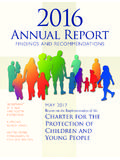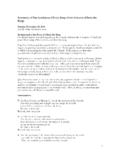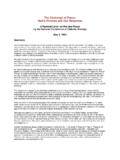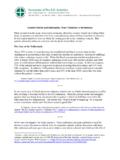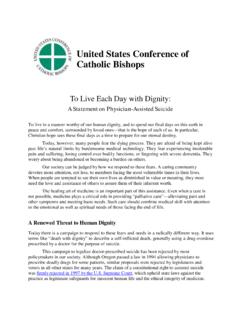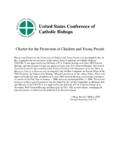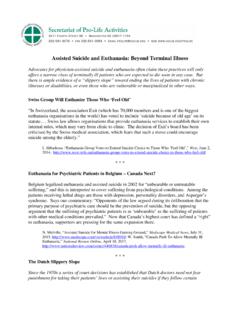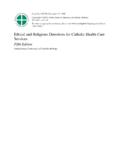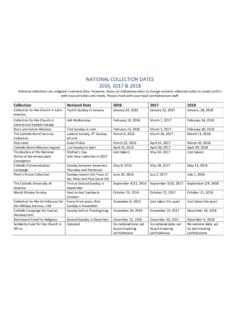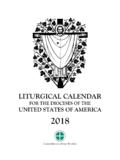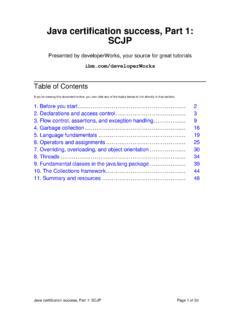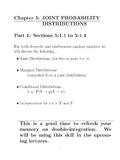Transcription of The Challenge of Forming Consciences for Faithful …
1 part I of II: Our call as catholic CitizensThis brief document is part I of a summary of the US bishops reflection, Forming Consciences for Faithful Citizenship, which complements the teaching of bishops in dioceses and Challenge of Forming Consciencesfor Faithful Citizenship If indeed the just ordering of society and of the state is a central responsibility of politics, the Church cannot and must not remain on the sidelines in the fight for justice. 1 So writes Pope Francis, quoting Pope Benedict XVI. Our nation faces many political challenges that demand well-in-formed moral choices: The ongoing destruction of a million innocent human lives each year by abortion Physician-assisted suicide The redefinition of marriage The excessive consumption of material goods and the destruction of natural resources, harming the environment as well as the poor Deadly attacks on Christians and other religious minorities throughout the world Efforts to narrow the definition and exercise of religious freedom Economic policies that fail to prioritize the needs of poor people, at home and abroad A broken immigration system and a worldwide refugee crisis Wars, terror, and violence that threaten every aspect of human life and As Catholics.
2 We are part of a community with profound teachings that help us consider challenges in public life, contribute to greater justice and peace for all people, and evaluate policy positions, party platforms, and candidates promises and actions in light of the Gospel in order to help build a better world. Why Does the Church Teach About Issues Affecting Public Policy?The Church s obligation to participate in shaping the moral character of society is a requirement of our faith, a part of the mission given to us by Jesus Christ. As people of both faith and reason, Catholics are called to bring truth to political life and to practice Christ s com-mandment to love one another (Jn 13:34). The US Constitution protects the right of individual believers and religious bodies to proclaim and live out their faith without gov-ernment interference, favoritism, or discrimination.
3 Civil law should recognize and protect the Church s right and responsibility to partici-pate in society without abandoning its moral convictions. Our nation s tradition of pluralism is enhanced, not threatened, when religious groups and people of faith bring their convictions into public life. The catholic community brings to political dialogue a consistent moral framework and broad experience serving those in need. Who in the Church Should Participate in Political Life?In the catholic tradition, responsible citizenship is a virtue, and participation in political life is a moral obligation. As Catholics, we should be guided more by our moral convictions than by our attach-ment to any political party or interest group. In today s environment, Catholics may feel politically disenfranchised, sensing that no party and few candidates fully share our comprehensive commitment to human life and dignity.
4 This should not discourage us. On the con-trary, it makes our obligation to act all the more urgent. catholic lay women and men need to act on the Church s moral principles and become more involved: running for office, working within political parties, and communicating concerns to elected officials. Even those who cannot vote should raise their voices on matters that affect their lives and the common good. Faithful citizenship is an ongoing respon-sibility, not just an election year Can catholic Social Teaching Help Guide Our Participation?In the words of Pope Francis, progress in building a people in peace, justice and fraternity depends on four principles related to constant tensions present in every social reality. These derive from the pillars of the Church s social doctrine, which serve as primary and funda-mental parameters of reference for interpreting and evaluating social phenomena.
5 3 The four principles include the dignity of the human person, the common good, subsidiarity, and solidarity. Taken together, these principles provide a moral framework for catholic engagement in advancing what we have called a consistent ethic of life (Living the Gospel of Life, no. 22). Rightly understood, this ethic does not treat all issues as morally equivalent; nor does it reduce catholic teaching to one or two issues. It anchors the catholic commitment to defend human life and other human rights, from conception until natural death, in the fundamen-tal obligation to respect the dignity of every human being as a child of God. catholic voters should use catholic teaching to examine candi-dates positions on issues and should consider candidates integrity, philosophy, and performance.
6 It is important for all citizens to see beyond party politics, to analyze campaign rhetoric critically, and to choose their political leaders according to principle, not party affil-iation or mere self-interest (USCCB, Living the Gospel of Life, no. 33). The following summary of the four principles highlights several themes of catholic social teaching for special consideration: these include human rights and responsibilities, respect for work and the rights of workers, care for God s creation, and the preferential option for the poor and Dignity of the Human PersonHuman life is sacred because every person is created in the image and likeness of God. There is a rich and multifaceted catholic teaching on human dignity summarized in the Compendium of the Social Doc-trine of the Church.
7 Every human being must always be understood in his unrepeatable and inviolable uniqueness .. This entails above all the requirement not only of simple respect on the part of others, espe-cially political and social institutions and their leaders with regard to every man and woman on the earth, but even more, this means that the primary commitment of each person towards others, and particularly of these same institutions, must be for the promotion and integral development of the person (no. 131). The Compendium con-tinues, It is necessary to consider every neighbor without exception as another self, taking into account first of all his life and the means necessary for living it with dignity (Gaudium et Spes, no. 27). Every political, economic, social, scientific and cultural program must be inspired by the awareness of the primacy of each human being over society.
8 5 SubsidiarityIt is impossible to promote the dignity of the person without showing concern for the family, groups, associations, and local realities in short, for those economic, social, cultural, recreational, professional, and political communities to which people spontaneously give life and which make it possible for them to achieve effective social The family, based on marriage between a man and a woman, is the fundamental unit of society. This sanctuary for the creation and nurturing of children must not be redefined, undermined, or neglected. Supporting families should be a priority for economic and social policies. How our society is organized in economics and pol-itics, in law and public policy affects the well-being of individuals and of society.
9 Every person and association has a right and a duty to participate in shaping society to promote the well-being of individuals and the common good. The principle of subsidiarity reminds us that larger institutions in society should not overwhelm or interfere with smaller or local institutions; yet larger institutions have essential responsibilities when the more local institutions cannot adequately protect human dignity, meet human needs, and advance the common Common GoodThe common good is comprised of the sum total of social conditions which allow people, either as groups or as individuals, to reach their fulfilment more fully and more easily. 8 Human dignity is respected and the common good is fostered only if human rights are protected and basic responsibilities are met.
10 Every human being has a right to life, a right to religious freedom, and a right to have access to those things required for human decency food and shelter, education and employment, health care and hous-ing. Corresponding to these rights are duties and responsibilities to ourselves, to our families, and to the larger economy must serve people, not the other way around. An economic system must serve the dignity of the human person and the common good by respecting the dignity of work and protecting the rights of workers. Economic justice calls for decent work at fair, living wages, a broad and fair legalization program with a path to cit-izenship for immigrant workers, and the opportunity for all people to work together for the common good through their work, ownership, enterprise, investment, participation in unions, and other forms of economic activity.
